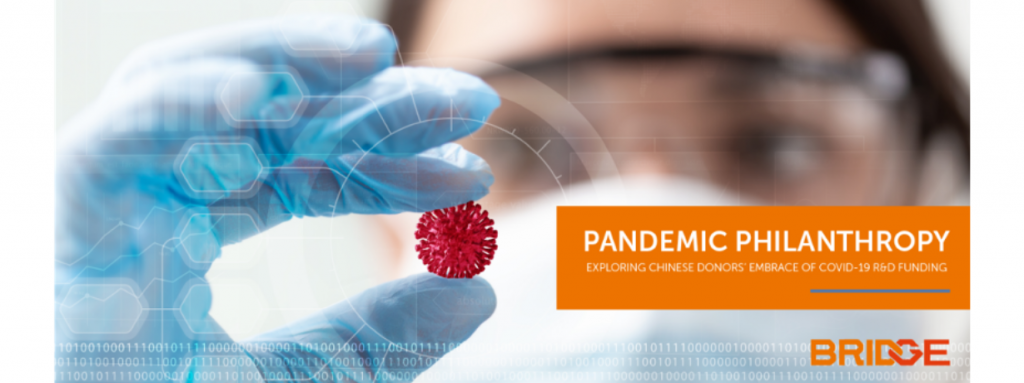4 min read
Andre Shen, founder and CEO of Bridge Consulting in Beijing, argues that COVID-19 could mark a watershed moment for Chinese philanthropy, as donors turn their attention to pharmaceutical research and development.
As more countries begin the cautious process of easing restrictions imposed in response to the COVID-19 spread, societies are asking what kind of world they will be emerging into. Will it be possible – or even desirable – to return to “business as usual”? Amidst the anxiety around the economic impact of the pandemic, there is also hope that the unprecedented experiences of recent months could prompt much-needed adjustments in policies and priorities to combat poverty and promote health equity.
The pandemic is already driving less obvious but potentially game-changing shifts across multiple sectors. Here in China, I was gratified to see the private sector and China’s entrepreneur-philanthropists quickly stepping up with generous donations of cash, goods and expertise to meet the immediate needs prompted by the outbreak in Hubei. But there was also something new – in addition to mask, ventilator and food package distribution, big names in tech and industry were channeling tens of millions of dollars to scientific research groups around the country who were leading the charge to develop testing, therapeutics and vaccines for COVID-19.
This is something that simply could not have happened a decade ago. China’s scientific capacity has grown exponentially during this period, both in scale and quality, as the result of government funding, private investments and international partnerships. China’s leading laboratories now compete – and more importantly, collaborate – with their counterparts in North America and Europe, and since 2013, the WHO have approved the first Chinese vaccines for UN procurement. This new interest in research and development (R&D) also reflects the rapid maturing of the philanthropic sector in China. As our new report Pandemic Philanthropy explains, not only are donations expanding each year, but new legislation has increased clarity and oversight, reflecting a realization by the government that the charitable sector has a crucial role to play in society.
But does this new focus on R&D funding by China’s biggest givers have anything to say to those outside the country? It’s no secret that the COVID-19 pandemic has increased geopolitical tensions, with science being weaponized in a global competition of narratives. But outside of the headlines, international cooperation is still taking place. The Jack Ma Foundation’s donations include over $4 million in funding to scientists in the United States and Australia. Headquartered in Norway, the Coalition for Epidemic Preparedness Initiatives (CEPI) has opened an office in Shanghai to more effectively coordinate with the research projects it is supporting in Chinese labs; China’s announcement of a $20 million commitment to Gavi, the Vaccine Alliance – founded by the Bill and Melinda Gates Foundation at the start of 2020 – demonstrates that support for multilateralism also exists at a government level.
The development of a successful COVID-19 vaccine is the greatest scientific prize in the world right now, and of course there will be immense prestige for the country or institution it emerges from. But whatever role China ends up playing in that process, we believe the trends seen in the first half of 2020 could represent a long-term shift in the ambition, scope and maturity of philanthropy in China, with donors and foundations thinking more strategically and long-term than ever before.
So what role can the wider regional and global philanthropic community play? If this trend does continue, China’s philanthropic sector will need to continue its professionalization, and that means international exchange and partnership with overseas foundations – with learning happening in both directions. Entering the realm of scientific funding demands a level of expertise not yet present in China’s charity sector, as well as new levels of rigor in governance, and outside experience and talent can make a huge contribution to both areas. Bridge Consulting, the company I head, specializes in the delicate strategy and communications work needed to broker these partnerships. We have worked with Gavi, the WHO and the Gates and Jack Ma Foundations among many others to amplify the impact of their work in China and globally. If you would like to learn more about how we could help you play a role in the trends described in this article, please read our report and get in touch.
It’s far too early to make confident predictions about what the world will look in a few months’ time, let alone on a scale of years. We know that the impact of COVID-19 will be grave for many. But there is an opportunity to start building now to ensure that long-lasting benefits emerge from this time as well. I believe that our report highlights one of these positive developments, albeit in its infancy, and I hope you will enjoy reading it.

















